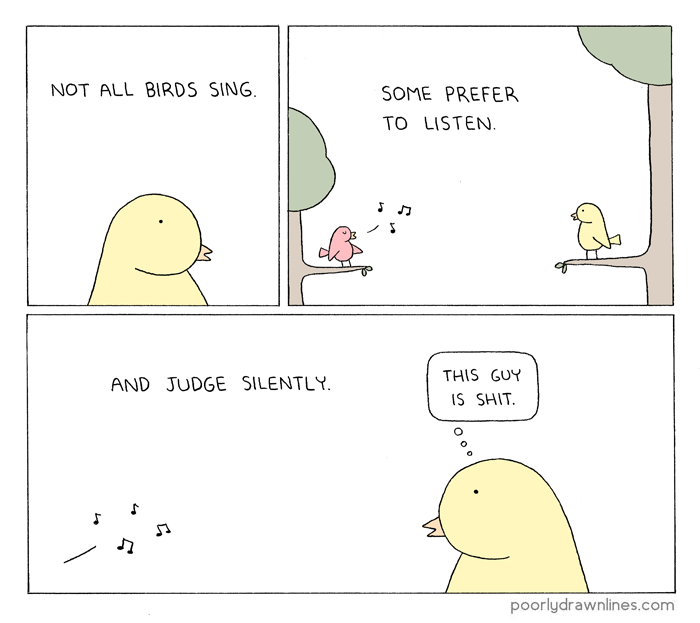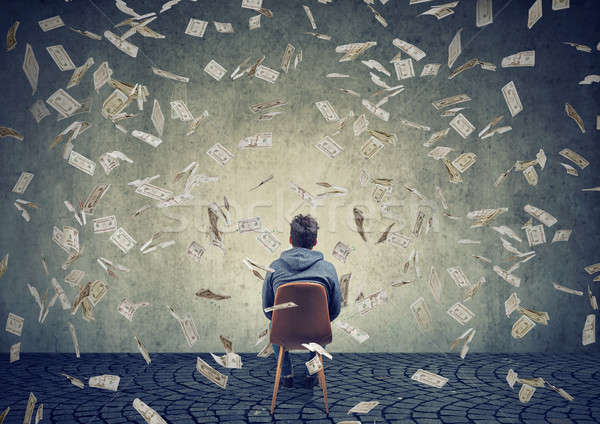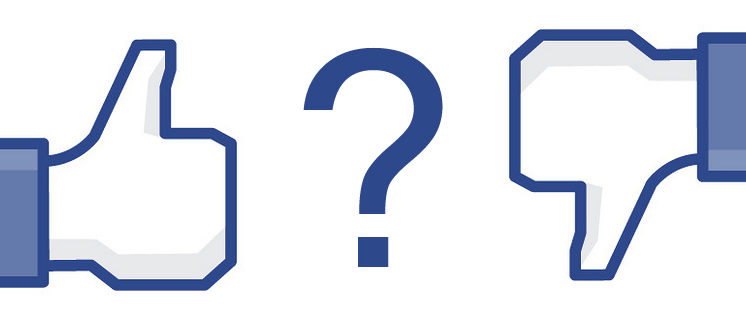And yet I’ve been nice saying ‘social media’ as if there was more than one.
At this point you should already know that there’s only one social media and that it’s Facebook.
Facebook is the biggest world’s publisher and yet not only it doesn’t pay for its content, but make people pay for it.
But let’s start from the beginnig.
You’ve heard about a time, probably before 2016, when people would open a Facebook page, post some witty or interesting content and voilà, thousands of followers would magically appear from nowhere and would engage with that content, to the point that some of those posts went viral and the thing snowballed into internet fame for some creators.
And you’re here, in 2020, still wondering WHY oh WHY this doesn’t happen to me today, most likely answering yourself that your content is not good enough.
Yeah I’m not kidding: more often than ever I talk to comics creators and the first thing that they say to me is always the same: “how did you do it??! How did you get so many followers on Instagram?? No one is looking at my comics, they must be really bad”.
Now, it may be that some content is just not refined or relatable enough to appeal to a super broad audience, but it’s also true that practically all types of content should be able to find its niche on social media.
How do we break the circle? How do we stop moaning about how poorely our reach does now compared to what ‘it used to do’ or how ‘people used to like our comics’ and we start looking at the harsh truth in the eye?
I say NOW. Let’s do it now.
First of all: yes, we all have THAT friend who made it even after the new algorithm apocalypse stroke.
Also, we all have a tendency to only wanna look at that friend’s stats, and never at the other gazillion friends who aren’t doing that well (but that’s an issue for another blog post).
Yes, even in 2020 there is some type of content that works best on social media, no matter how many efforts Facebook makes to shut it off to make them pay for reach instead of just earning it organically.
When a post is crafted in a way that the algorithm can easily digest it (and we’ll see right away what I’m talking about) there are still a few chances (more in the likes of one in the thousands) that that post will become viral. But that doesn’t stop there, because Facebook will always come in at some point and try to prevent that creator to create enough engagement to keep on growing as fast as they should.
To make it very simple, an easy-to-digest post for the Facebook algorithm would be what also works for their paid reach (their ads campaign). They don’t even try to hide it:
1. extremely synthetic text (even better with no words at all)
2. extremely synthetic style (neat lines, b&w with no shades or in alternative bright colors, etc)
3. relatability or not too edgy quirkiness
4. instantly easy to connect to (it does have to create an immediate connection, better if emotional, with the audience)
5. it has to be well-crafted, with a recognizable style
It’s really not a mystery, it’s nothing all those ’10 secrets to grow here and there’ articles aren’t repeating over and over again. It’s mechanical. You feed the algorithm the right food, it’ll appreciate.

Back to our business.
So far we’ve explained that the algorithm prefers a certain type of content and that that content has way more chances than the average type of content to become viral.
I guess you’re already thinking: I don’t have that type of content so this does nothing to me. I have to understand how to get viral WITHOUT putting out that type of content.
And I repeat: as they do in the real world, many different niches and publics exist also online.
Problem is: Facebook won’t let you reach them. Facebook is not gonna do the work for you.
You can try and scout for groups and pages, tag them and hustle and ask them to repost your content hoping that some good soul will accept your spam. But most likely you won’t succeed and people who love red bulky notebooks won’t ever see your comics about the adventures of a red bulky notebook.
So can we focus for a second on the why they won’t ever see it?
How did we get from a world were social media were there for people to connect to each other to a modern era where social media are only there to steal our time and sell it to the highest bidder?
There we go: weirdly enough, they researched for years for a way to capitalize on that giaenormous amount of data they were sitting on (yes, still talking about Facebook) and they found it.
They experimented with a lot of different things (and those who are on Facebook since more than a decade, like me, kinda saw them all fail) until they perfected the algorithm into a shitamountofmoney-making machine.
They didn’t do it alone. They were on the same run with Google, their main competitor. So they kinda took inspiration from one another, but this is also a story for another time.
I suggest you check into how advertising works on Facebook here. Yeah I know, that’s boring stuff, but does it help if I tell you that Google works in the same way? This way you will basically know how all advertising works online. Not bad for 5 minutes of your time (that you usually give for free to Facebook for no return whatsoever).
A FLAWED SYSTEM
Anyway, even if you don’t check out that article, what you need to know is that the way advertising works on Facebook is FLAWED. Under many many points of view.
We’re all tempted to liquidate it with a simple ‘it’s a private company, they should be allowed to make money with their work‘ and I gotta say I’m tempted to say the same. As a private business myself, I believe that hard work plus investments should be rewarded with a lot of cash if the result of this sum is added value.
Problem is, Facebook is not adding any value here.
Not anymore. They’re actually stealing as much value as they can and we’re letting them do it, still blaming ourselves for not being good enough. And guess what: that feeling of not being enough? Also a Facebook byproduct. The very opposite of creating value.
And guess what: that feeling of not being enough? Also a Facebook byproduct. The very opposite of creating value.
Facebook is currently stealing from us (doesn’t matter if we’re talking Facebook itself, Instagram or Whatsapp, it’s really all the same).
They’re stealing:
- our data (and after Cambridge Analytica we finally all agree on that)
- our time (read about the definition of attention economy here on Wikipeda)
- our copyrights (oh yeah babe. They do. Even if you think that you put your content there on your own free will and not for the lack of alternative in a monopoly)
- our money (whaaaaaaaaat…. yes.)
So picture this: you are a random Facebook user. As a user you give the platform 2 things: your data and your time. This makes you a product, a commodity, if you will, an asset. I prefer the word product, I think it resonates better. A product that Facebook will sell to its customers aka to marketers. You give yourself to them for free, but Facebook charge his customers for the product ‘you’.
Then on the opposite side of the equation you have who? Facebook’s customers: and guess what? It’s you again!
You are the person who goes on Facebook hoping that someone will see their stuff (we talking about comics but it applies to virtually everything). This way you curate and post your own copyrighted material on Facebook, again for free, and you even go as far as buying advertising to promoted it, engaging directly your wallet. And again, Facebook takes those without flinching. Facebook takes the product ‘you’ for free and sells it to another ‘you’, for money.
And what do they give you in return for your free time/data/copyright and money?
An amazing sense of addiction, frustration and unsatisfaction about yourself, the world and life in general¹.
Isn’t that a great deal? Who wouldn’t sign for that!
Wait, what? You didn’t sign for that?
But that’s exactly what you’re getting.
Cause Facebook saw that those happy creators, those pre-2016 Facebook creators ((pre-2019 for Instagram) weren’t making them enough money. The main reason was that they let people (again, you, always you, there’s no one else we’re talking about but you and Facebook) actually discover your amazing content. These people engaged with it and they were happy. You were happy that they found you. Everyone was happy!
You even had the option to negotiate directly with your sponsors if you wanted to, can you believe that?
Can you believe that Facebook wasn’t getting any piece of this pie so they absolutely hated it?
And what exactly prevented, at this point (again this pre-2016 point), Facebook to become like Uber or Airbnb and just get a cut of the deals that were provided through the platform?
Nothing. Nothing but the fact that that wasn’t nearly close enough to the economic potential of the platform.
That would have benefitted happy people and kept them that way and would have made Facebook rich, but not nearly as rich.
So they kept on collecting data and testing, collecting data and testing… Until they found out what makes people put the rational part of their brain on airplane mode and start reacting impulsively to the point that you could make them do whatever you want: when they’re addicted and miserable.
It took a while. They needed to make a lot of tests, they needed to make sure it wasn’t too visible too soon, otherwise people would have noticed.
In order to make them addicted they needed a monopoly, so they started to buy off competitors and add features into the platform that will get people trapped inside, with no need to go visit other websites. They started by adding messaging, videos, news, marketplaces. Facebook needed to be a self-sufficient nation and they started cutting even more bridges with the outside world.
Now when you link to an external website they cut the reach even more. They don’t want you nor anyone to leave.
They designed interfaces that look so basic and yet so complicated to make it look like they’re not making an effort (yeah, for sure they don’t have the budget to improve their interfaces…!) this way you don’t care too much if it takes you 10 to 15 clicks to arrive to the point where you wanted to go, without realizing that thanks to that trick you’ve spent 15 seconds more in the platform.
And what’s 15 seconds more for you?
Nothing, right?
And what’s 15 seconds more of your time for Facebook?
Money.
Money that, again, you’re giving them for free.

WHY SO SERIOUS
Let me tell you this: I’m TIRED.
I’m dead tired to hear ‘I’m not good enough because I don’t make new followers of social media’.
I’m as tired as a person can get when they have a friend in abusive relationship blaming themselves for the abuse.
And what’s 15 seconds more of your time for Facebook? Money.
Money that, again, you’re giving them for free.
You are not succeeding because someone designed a platform to make you fail.
You need to internalize this.
I know that it’s hard, because you see other people succeding (mostly by chance, rarely for their talent, but thanks god there are still people succeeding ’cause they’re talented) and even more because Facebook spent a gazillion dollar to make you addicted and miserable so you will blame yourself for your failure.
But you need at least to see the truth.
Most likely it’s not your fault. 99,99% chance that it’s not your fault.
Thanks to Facebook (and Google) and the fact that no one else is tyring to do anything differently because this money-making machines are so well designed, we now live in a world where they can drain pump resources for free from you and then make you pay to have them back after a quick repackaging. All the while making you feel bad about that.
When you pay for a Facebook ad you might end up with the impression that you paid for an actual service, without realizing that reaching your public (no matter how precisely targeted) was the first goal of the platform in the first place, it own reason to exist, what they adverside themselves to you with: a way of connecting you to other people.
BUT THEY DON’T.
That is false advertising.
They actually block you from reaching your readers. They turn the tap on and off to make you believe it depends on you and your content if the water is running or not, but it FUCKING DOESN’T. It’s THEM. It’s them all along. It’s part of a design to make you hooked and miserable, make you buy ads and make you fall under the wrong impression that they’re really offering you a service.
But that audience was always there, you were always there, as a user. Your content was always good. They’re selling you to yourself.
CONCLUSION
I am so sorry if there is no silver lining here.
This is actually a sad story that doesn’t end well.
We still live in a world were Facebook is fined 5 billions and it comes out stronger than ever, by making Instagram users/customers paying for their awfwul practices. Now we have 2 Facebooks, more depressed creators than ever before, and no new platform in the horizon to save the day.
What a mess.
I have no “10 techniques to grow your Insta” bullshit for you.
I grew my Instagram because I was making relatable content when the platform’s algorithm was like Facebook’s old algorithm and actually worked as advertised by Facebook, aka letting you reach other people and connect with them.
Now Instagram it’s nothing but a Facebook 2.0 so I don’t know what to tell you apart from buy your own assets by paying for some advertising.
Why shouldn’t I recommend you to do that if that’s your final goal? I’ve paid for advertising myself.
Just know the truth.
It’s not your fault.
Just that.
And the world will be already a slightly less shitty place.

NOTES:
- At this regard you can read this article of the Guardian about the filter bubble and the politicisation of social media.


Can you–do you…I’m not even sure what to ask. This information has both confirmed everything I suspected and blown my mind at the same time.
How about marketing outside of FB? But still on the internet. Or not. At this point I’m willing to print cartoons and leave them on car windshields.
Actually, I might do that.
Some creators were able to find a new success on Tiktok but as far as I know things are slowing down there too. The latest things is “Threads” by Facebook. The only thing you can do is try to jump on the new train, when there’s still room for conquest before the inevitable moment when they’ll put everything behind a paywall. Another option is to find a niche and to work it consistently.